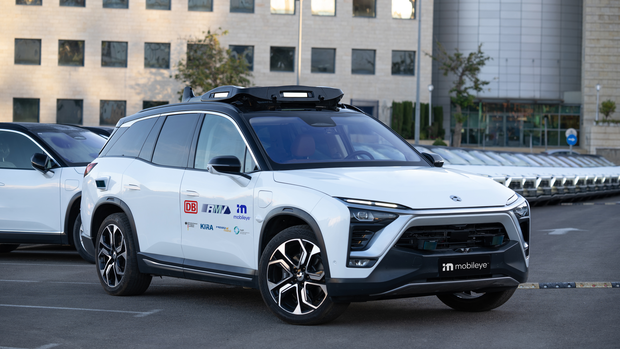Berlin Mobileye, the Israeli subsidiary of the American chip manufacturer Intel, will not apply for approval for an autonomous vehicle. The Handelsblatt found out about this as part of the federally supported pilot project “AI-based regular operation of autonomous on-demand traffic” (Kira).
With the project, a total of 15 self-driving cars should transport people in public transport as a shuttle service for the first time worldwide. Some of the vehicles should drive in Darmstadt, the other in Offenbach. In order to use such vehicles, type approval from the Federal Motor Transport Authority is mandatory.
The Federal Ministry of Transport confirmed the relevant information about the setback for autonomous driving. The ministry was “informed about this decision,” a spokesman told Handelsblatt. “This decision is a corporate decision, the reasons are not known to the Ministry.”
In the last legislative period, the federal government created the legal basis for local transport companies to be able to use fully automated vehicles in “defined operating areas over a period of five years” if they were previously approved by the Federal Motor Transport Authority and are monitored during operation via a control center in order to human intervention in an emergency.
Last year, the federal government provided a total of 55 million euros to promote “autonomous and networked driving in public transport”. Four million euros should flow into the Kira project alone.
Project should start in May
Mobileye was to equip vehicles from the Chinese manufacturer Nio with an autonomous driving system. A first vehicle is already in Germany. After a testing and mapping phase, the vehicles should drive autonomously on previously defined routes.
Deutsche Bahn has two autonomous e-shuttles on the road.
(Photo: DB Regional Bus)
Deutsche Bahn is involved in the project, whose subsidiary Clevershuttle operates the vehicles and, after the pilot project, should use them permanently as part of local transport in consultation with the Rhein-Main-Verkehrsverbund, a local partner and the Offenbach district public transport company. Clevershuttle itself spoke of a “world premiere”.
Deutsche Bahn celebrated the project in February as a “revolution in local public transport”. Federal Transport Minister Volker Wissing (FDP) spoke of a “game changer”: Autonomous vehicles should drive through the city and transport people – only remotely should a person be able to control via a control center and intervene in an emergency.
The vision: Vehicles pick people up at the push of a button from the train station or bus stop and drive them home – without expensive drivers and therefore cheap, even in rural areas. Local transport would no longer only be the privilege of city dwellers, but also a real alternative to the car in sparsely populated regions.
Project Kira should start this month. This would have required a type approval of the vehicles. As the ministry explained, “a test permit” would now be sought for the Nio vehicles.
>> Read here: Autonomous driving: the government is waiting for the manufacturers
Then the vehicles could be “used with a safety driver”. One thing is certain: the desired driverless operation will not exist. In the context of the project, there is talk of a “disaster”. It must now at least be stretched in time, according to project circles.
Mobileye does not meet the requirements of the funding project
Mobileye did not want to comment on the reasons why the company will not apply for type approval after repeated requests. A spokesman simply stated that the company was involved in the project and that the pilot phase “will start shortly with a Nio ES8 – with safety driver and retrofitted with Mobileye’s self-driving system”. The pilot phase is “an important step in validating and testing the vehicle under real conditions in Darmstadt and Offenbach.”
Deutsche Bahn celebrated the project in February as a “revolution in local public transport”. Wissing spoke of a “game changer”.
(Photo: dpa)
Mobileye thus missed important specifications of the funding project. Accordingly, the vehicle used must be able to drive autonomously. It must also be directly available and be able to travel without a security driver in the future.
There was another setback for the project last week: Deutsche Bahn had declared that it would withdraw from the Clevershuttle start-up. Clevershuttle then filed for bankruptcy.
The Clevershuttle subsidiary involved in the project is “not insolvent”, said Minister Wissing’s spokesman optimistically. The ministry is in close contact with the project partners and assumes that the project will continue. But the insolvency administrator must now decide.
Deutsche Bahn itself had hoped to use the Kira project to make “local public transport as convenient and flexible as having your own car”, as the head of the regional division of Deutsche Bahn AG, Evelyn Palla, announced at the beginning of the year.
>> Read here: Bahn stops financing – Clevershuttle operator files for bankruptcy
It is unclear how things will continue. First of all, everyone involved has to start looking for a vehicle that can drive autonomously. But these vehicles do not exist, not even from German manufacturers.
Experts do not expect that a provider will apply for type approval in the course of the year. Possible companies that could make such an application from next year include names such as Volkswagen and suppliers such as Benteler, ZF and Schaeffler.
Since there will be no driverless vehicles for the time being, the ministry itself only speaks of the Kira project as a “research project”. This makes a major contribution to “creating basic knowledge and accelerating this development”. The project goal – autonomously driving vehicles in normal local traffic – will be “pursued step by step”.
More: VW boss Blume cleans up: Volkswagen reorganizes software unit.
